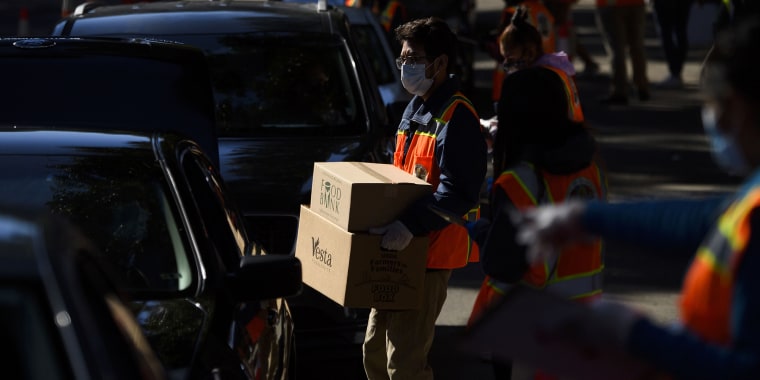The expansion of food programs during the pandemic appears to have helped address the sudden jump in hunger as the coronavirus caused shutdowns and economic crises nationwide, and that appears to be driving the conversation around the benefits in a new direction.
But some of those programs could soon expire despite having demonstrated their ability to combat hunger, especially among children, according to food security advocates.
"Hunger is a solvable problem," said Lisa Davis, the senior vice president of the No Kid Hungry Campaign of Share Our Strength, a nonprofit anti-hunger organization. "So right now, as we're all seeing some light at the end of the tunnel, it's time for us to be bold and build on what we've learned during the pandemic, especially as we bridge out of crisis and into recovery and rebuilding."
Advocates and experts have particularly celebrated the 15% increase in maximum funding for people receiving the Supplemental Nutrition Assistance Program benefit, or SNAP, commonly called food stamps. Once fearful that conservatives and the Trump administration would add work requirements to the benefit, they now warn that the padded benefit is scheduled to expire at the end of September and are pushing to make it permanent.
Many consider SNAP to be the backbone of the fight to address hunger in the U.S. but complain about the formula that calculates the amount of money hungry Americans get, especially with rising food costs and needs.
Without the expansion, the national average of the SNAP benefit per meal came to $1.97, even though the average meal cost was around $2.41, according to an analysis released this week by the Urban Institute, an economic and social policy think tank. SNAP's maximum benefit last year without the expansion passed by Congress came up short of low-income meal costs in 96% of U.S. counties.
The expansion of SNAP benefits, which the American Rescue Plan most recently extended to September, increased the benefit per meal to $2.27. That still falls short of the meal costs in 41% of U.S. counties, but hunger advocates note its significance.
"We saw that initial shock at the beginning of the pandemic, but food prices have stayed up," said an author of the study, Elaine Waxman, a senior fellow at the Urban Institute. "So that's another reason why those enhanced benefits have been really important given that your dollar doesn't go as far at the grocery store right now."
Rep. Jahana Hayes, D-Conn., chair of the Agriculture subcommittee on nutrition, is a former SNAP recipient herself.
Hayes supported the 15% increase, but she said it needs to go further. She has introduced bills to push the expansion to 30% and extend its benefits to college students. Her office said she is closely following the Agriculture Department's congressionally ordered update to the Thrifty Food Plan, which decides SNAP benefit amounts.
"Prior to the 15% increase implemented during the COVID-19 pandemic, about one-quarter of all SNAP households exhausted nearly all their benefits within a week of receiving them, and more than half of households exhausted all benefits within the first two weeks of the month," Hayes said. "That leaves millions of families struggling to make ends meet for half the month — even on assistance."
The push to end hunger — which she called "a moral imperative" — comes down to the policies that Congress can hammer out.
Much of the hope for policy change in food security lies within President Joe Biden's ambitious American Families Plan, which Democrats intend to roll into a reconciliation package this year.
"Hunger and food insecurity are not new issues in America — in fact, they're problems that have plagued our nation for a long time," said Jamie Bussel, a senior program officer at the Robert Wood Johnson Foundation. "What's new here is this sense of urgency felt by policymakers, leaders and the public, and so I think we have a real window of opportunity in the public discourse."
Hunger advocates said stimulus checks and the child tax credit program, which expires in December, have helped many. Even Republicans, such as Senate Minority Leader Mitch McConnell of Kentucky, have put their support behind the new summer food program for children that provides greater flexibility in serving meals to kids.
Some hope there is room for bipartisanship around hunger.
Kentucky Agriculture Commissioner Ryan Quarles said he is pushing legislation with the help of McConnell and Sen. John Boozman, R-Ark. He said the high-profile senators are working with Democrats in the Senate to address hunger, which he said he finds encouraging.
Addressing hunger and creating effective food programs should not be partisan, Quarles said.
"I think we can all agree that we need to complete an evaluation of what worked and didn't work to address and reduce food insecurity in America coming out of the pandemic," he said. "And secondly, I think everyone can agree that we should make it the most efficient and cost-effective program that we can possibly make it."
It appears there is some room for hope.
Quarles and Hayes said small businesses need to have a greater role in conversations around SNAP. Hayes wants to bring small businesses into SNAP's online purchasing program, and Quarles emphasized his push to buy food for low-income Kentuckians from local farmers.
"I think we've done a good job, but I think there's another lesson that we can learn to do better going forward," Quarles said. "We need to do a complete evaluation of our food programs and learn about ways we can do it better while at the same time supporting local food systems."
This story was originally published on NBC News.
Related:

